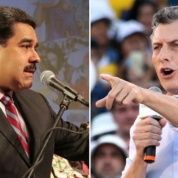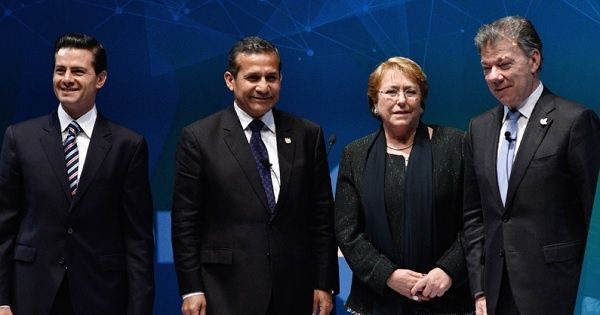The Common Market of the South, commonly referred to as Mercosur, was founded 25 years ago in order to promote free trade and movement of peoples and goods.

The world's fourth largest trading bloc after the EU, NAFTA and the Association of South East Asian States, or ASEAN, the bloc comprises a population of over 270 million people and the combined GDP of the grouping— whose main members consist of Argentina, Brazil, Paraguay, Uruguay, Venezuela— is US$3.5 trillion.
RELATED:
Pacific Alliance Seeks Economic, Not Ideologic Integration
Since its creation, the bloc has been used in part to promote free trade but Mercosur has also played an important role in strengthening regional political and cultural integration.
But as Argentina and Brazil shift to the right, the hope of a genuinely progressive Mercosur looks increasingly threatened.
teleSUR takes a look at the power struggle currently taking place at the heart of the bloc, and what this means for Latin America and the wider region.
Hugo Chavez's Dream

In 2004, late Venezuelan President Hugo Chavez sought full entry into Mercosur, which was then led by the leftist leadership of Argentina and Brazil, who along with Uruguay approved Caracas' membership bid. But the government of Paraguay, led at the time by the right-wing President Nicanor Duarte, vetoed Venezuela's application for full membership, citing concerns about a “lack of democracy” in Venezuela.
Venezuela signed a membership agreement in June 2006 but only became a full member on July 31, 2012, after Parguay was suspended from the bloc following a parliamentary coup against the left-wing President Fernando Lugo, who was removed from office a month before. Mercosur viewed the move by the Parguayan right-wing to "impeach" Lugo as a violation of the bloc's so-called "Democratic Clause."
The inclusion of Venezuela into Mercosur alongside Brazil's Dilma Rousseff, Argentina's Cristina Fernandez de Kirchner and Uruguay's Jose Mujica gave the bloc an opportunity to push a different form of regional integration that was political and socially-oriented rather than exclusively economic.
"The great power of South America is being born, and Mercosur is its largest engine,” said President Chavez in 2012. But four years later, does this still hold true?
The Neoliberal Shift

In 2016 right-wing, neoliberal presidents are at the center of Mercosur, marking a shift in regional dynamics and spelling potential disaster for regional integration on socially-oriented lines.
Elected in 2015, Argentina's Mauricio Macri has promised he will work toward moving the bloc closer to the Pacific Alliance in which Chile, Colombia, Mexico and Peru are full members. Argentina recently became an observor state.
Founded in 2011, the Pacific Alliance amounts to around 50 percent of Latin America's international trade. Critically, the members have signed a series of free trade agreements with the United States and the EU, eliminating 92 percent of taxes on goods traded among cooperating states.
Macri's political motives appear targeted at promoting a free trade agreement between Mercosur and the EU. Although not mentioned by Macri, part of his strategy could also be to include a larger bloc of countries in the Trans-Pacific Partnership, or TPP.
To add to this, the right-wing Argentine president has made no secret of his opposition to Venezuela's Bolivarian Revolution and President Nicolas Maduro, even calling for the expulsion of Venezuela from Mercosur.
Venezuela to Still Lead?

In late June, the Uruguayan government suspended Mercosur's upcoming July 12 presidential summit amid increasing pressure from regional right-wing governments who oppose Montevideo's pro tempore presidency being handed over to Venezuela.
At the same time, Paraguay's Foreign Minister Eladio Loizaga released a statement, saying his country does not accept Uruguay's decision to hand Mercosur's reigns over to Venezuela.
“Whatever member presides over Mercosur, he must be committed with the principles based on human rights as stipulated in the Asunción founding charter, and most specifically abiding by the democratic perception of the situation," he said.
But Venezuela assumed the pro tempore presidency of Mercosur on Friday after Uruguay's Vice President Raul Sendic dismissed Paraguay's opposition to the move, arguing there are "no grounds to apply" the Democratic Clause to Venezuela.
Meanwhile, the Paraguayan foreign minister has confirmed the government is in talks about Venezuela with Michel Temer's coup government in Brazil, which recently criticized Mercosur and said the bloc needs to be "revised."
The lines of division couldn't be clearer, so what now and where does Mercosur—and the region—go from here?
Free trade in the works

Led by Chavez's dream of a continent unified by principles of solidarity, back in the early 2000s Latin America refused to be part of the U.S.-proposed Free Trade Area of the Americas, or ALCA, which sought to promote free trade policies across the hemisphere.
Branding the Washington-led ALCA a "tool of imperialism," the Chavez-led Bolivarian Revolution chose a different path, resulting in widespread poverty reduction, a decrease in inequality, free healthcare and greater access to education for everybody. Crucially, this inspired social movements and ultimately governments throughout the region, resulting in the rise of the so-called "Pink Tide."
But after years of highly popular, democratically elected left-wing governments at the center of Mercosur, there is no denying the bloc and region has undergone a transformation and today, the main tenets of neoliberalism—deregulation, privatization and fiscal austerity—are back on the agenda.
Twenty five years since Mercosur was established, this shift in regional alliances and interests has seen the bloc edge further away from the principles of promoting political regional integration and social justice. Going forward the battle within Mercosur over the principles and policies it adopts will be one of the most important in deciding what the future holds for Latin America.